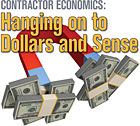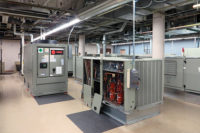
Canada and the United States are trading partners and neighbors, and according to the Department of Commerce’s U.S. Commercial Service, “The relationship between the United States and Canada is the closest and most extensive in the world. It is reflected in the staggering volume of bilateral trade - the equivalent of $1.5 billion a day in goods - as well as in people-to-people contact. About 300,000 people cross the shared border every day.”
Because of all the trading that occurs between Canada and the United States, it’s not surprising that the current economic downturn that began in the United States has also affected Canada.
The Canadian government’s Statistics Canada reported in its “Labour Force Survey” released on April 9 that, “Employment declined by 61,000 in March, all in full-time work. This decrease pushed the unemployment rate up 0.3 percentage points to 8 percent, the highest rate in seven years.”
The March unemployment rate in Canada is not far off from the March unemployment rate in the United States.
“Nonfarm payroll employment continued to decline sharply in March (-663,000), and the unemployment rate rose from 8.1 to 8.5 percent,” stated the Bureau of Labor Statistics of the U.S. Department of Labor.
Just as different industry sectors and states have been affected individually by varied economic events in the United States, the provinces and industries of Canada are experiencing varied effects as well. Location really does matter, especially to the Canadian HVAC contractor.
CONTRACTING IN CANADA
Brian Baker, president of Custom Vac Limited in Winnipeg, Manitoba, considers the overall Canadian economy to be strong, especially in his neck of the woods.“While there are pockets that face some challenges, the economy in Manitoba is excellent and growing,” he said. “We never have been a boom-bust province.”
Roger Grochmal, president of AtlasCare in Oakville, Ontario, however, is seeing a different picture of the economy and its consequences. “The economy is slowing down and consumer demand is falling off,” he pointed out. “We [Canadians] are deeply affected by the reduction in softwood lumber exports due to the collapse of the housing sector. As well, we are (in Ontario) hugely affected by what is going on in the automotive sector. Parts suppliers are taking it on the chin and plants are closing daily. The final chapter in this is yet to be written.”
As for other parts of Canada, the Heating, Refrigeration and Air Conditioning Institute of Canada (HRAI) is hearing varied reports.
“There are some sectors we’re hearing from that the service side of things has picked up,” reported Warren Heeley, president HRAI. “The control side - meaning energy-efficient control and things such as that - existing building owners are looking at, and so that seems to be a sector that’s not doing too badly. That’s some of the positives that I’ve heard recently. We’re not hearing a lot of bad news, I guess, other than everybody’s concerned, and everybody knows it’s slow.”
SO, WHAT NOW?
The world has felt the effects of this economic downturn for more than a few months, and by now contractors, as business owners, have probably made changes to their organization, if they’re going to at all, due to the economic times in which they live.Baker said that his company hasn’t changed what it does because of the economic situation; it’s business as usual for his company.
“We continue to work to find a niche market and flex with the changing buying habits of our clients,” he said. “We also keep to a size whereby we can make changes on the fly when our competition cannot. It’s all about understanding the clients and how they change and knowing that they are better educated, and when they are not, we play the role of the educator, so that they understand the differences that we provide.”
On the other hand, AtlasCare has made some changes to compensate in the recent months. “Recessions cause you to do the things that you should have been doing all along,” said Grochmal. “We have shed underperforming people and reduced costs in all areas. This has had a positive effect in keeping our bottom line from disappearing.”
He said that there are certain things they have not done in pursuit of more revenue. “We haven’t cut prices or resorted to taking on work that doesn’t fit into our skill set.”
To be proactive, there are several things that AtlasCare does or has taken actions toward, in order to keep the money flowing.
“Sales leads are like gold, and we treat them as such and follow them through very diligently,” said Grochmal. “We have tweaked our service contract offering and aggressively introduced monthly payment plans to make it easier for our customers to stay with us.”
The company is also about to launch a new Website that, “Moves from being just a source of good information to our customers into a vehicle for generating new customers for the company.”
AtlasCare has also launched a line of private-label furnaces, air conditioners, and IAQ products to “leverage the unique brand that we have in our market.”
Both Grochmal and Baker commented that contractors should not have a doom-and-gloom attitude.
“Challenge your people to keep looking at the glass as half full. If 10 percent of the population is unemployed, then 90 percent still are,” said Grochmal. “Research has shown that while discretionary purchases are way down, people are spending money to keep their major investment, their home, in good shape.”
Baker also remarked that it helps business to stay optimistic.
“A positive attitude everyday will bring more dollars in the door in one day than you can imagine,” he said. “Be negative and you can be certain to work a week or more to make up for one bad day.” Baker also advised other contractors to, “Talk to your clients and staff and deliver what they want to reduce their stress and make their lives better.”
MONEY FROM THE GOVERNMENT
One way to possibly lower customer-spending stress is for them to save money through various incentives and tax credits that exist through different levels of governments, and even through some utilities, in both the United States and Canada.HRAI has been involved in governmental incentive discussions representing the industry. The association even administers a province of Ontario incentive program for the Ontario Power Authority, according to Heeley.
“There’s a wide variety of incentives that are being offered to improve efficiency and reduce greenhouse gas emissions, whether it has to do with a municipal, what we call a local distribution company, which would be like a municipal electrical utility, right up to the federal government,” he said.
Grochmal noted that the tax credits and incentives have helped his company. “The business level with homeowners remains artificially high due to the incentives for energy-efficient products and tax credits for home renovations by both the federal and provincial governments,” he said. “Our customers are taking advantage of this.”
He added that when these rebates are phased out, it would affect incoming revenue levels.
While the assortment of tax credits and incentives are still around, it was advised that contractors assist their customers in taking advantage of them. With the help of the association, the HVAC contractor, no matter the location, can keep abreast of the current incentives and keep up to date on any new ones that are added. To assist contractors in their pursuit of tax credits and incentives to offer their customers, HRAI is keeping watch.
Heeley said, “We’re [HRAI] trying to provide as much information on an ongoing basis, to our members, about what’s being offered out there, whether it’s commercial or residential, that can help.”
Publication date:06/08/2009





